
I'LL NEVER FORGET WHAT'S'iSNAME:
A TRiBUTE TO CHARACTER ACTORS
PAT HiNGLE
~ by john cribbs ~
In this semi-regular column I'll be writing about some of the excellent character actors whose work I've enjoyed over the years. The inspiration for the column was the great Pat Hingle, for reasons related below. The content of each article is going to include a quick appreciation of the actor from my own experience and the films I know him from*, followed by two or three movies, selected randomly from the individual's large body of work, that I'm seeing for the first time. The power of great character actors is their ability to be memorable making anonymous appearances in random movies that you see for other reasons, either other (more famous) actors or directors or because you heard there was this really awesome twist involving a haunted dress. Therefore, I thought it might be appropriate to honor them by choosing films based solely on their name being in the credits, retroactively giving the chosen subject his due.
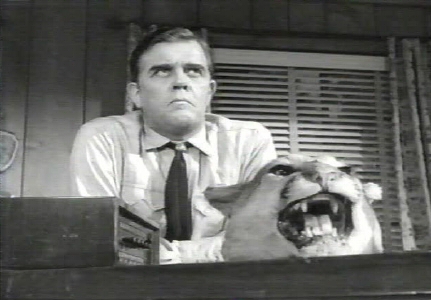
PAT HiNGLE
As I mentioned recently, my old man went under the knife a couple weeks ago and has been recuperating at home. During his convalescence we've been catching up on a couple of film series on glorious Blu-Ray on his transplendent 50-inch Sony HD screen: the Starship Troopers trilogy, some of the Roger Moore James Bonds etc. Just the other day we wrapped up the Dirty Harry series - for the record the first two are great, the second two have moments of greatness, and the fifth entry... well, it's good to see Harry back. Watching Sudden Impact again for the first time since high school, I was surprised how little I remembered about it. In particular I had completely forgotten the subplot involving Pat Hingle's beach town sheriff who, apart from the usual authoritative distaste for Harry's antics, has some kind of secret he's hiding throughout the film. I love Pat Hingle, and he's the best part of the movie: he delivers a monologue to Sondra Locke that's quietly devastating, and then he's mowed down, another victim of the vicious punks who've haunted him his entire life. Really good stuff.
The next day I decided to google Hingle (note to self: "Google Hingle," funny character name) and see what he was up to. Sadly it turns out he passed away at the beginning of the year at age 84. It's not surprising that the news failed to reach me: character actors usually don't get a lot of press when they pass on. But it's a real shame, and it inspired me to start a semi-regular series on this site: a little ode to character actors, not any kind of definitive study of their life and careers, just brief appreciations.
Although it was his death that got me interested in doing this series, Pat Hingle is actually an ideal starting point in any case. In many ways he is the perfect example of the character actor. He started in theater and continued appearing in plays well into his film career, but unlike other actors to make the transition from stage to screen (Marlon Brando, Paul Newman) he never became a huge star. Instead he filled in as doctors, military officers, sheriffs and other high-ranking lawmen, judges (Hang Em High, The Hunter's Moon, Shaft 2000), bartenders (The Quick and the Dead) and a handful of inspirational coaches (Running Brave.) His list of 194 acting credits on imdb is saturated with TV appearances. Character actors only get more interesting as they get older, and the pug-faced veteran's most frequent appearance in 80's movies was as the weathered father with a strong moral center. Who could forget his disapproving scowl at loser Sean Penn as Timothy Hutton's dad in The Falcon and the Snowman? His simple condemnation of his son at the end, when a family friend with connections offers a deal that will ostensibly let traitor Hutton off the hook entirely and Hingle lowers his head like an unsympathetic arbitrator and responds "Let him be judged," makes that entire boring movie worth sitting through to get to that moment.
When he wasn't playing a paternal or authority figure, he could usually be found behind the counter of some rundown diner, like his memorable turn as Hendershot in Stephen King's Maximum Overdrive: "I don't give a ladybug!" A signature of Hingle's, especially in his later performances from the 80's and 90's, was turning from charming old man one minute to raging nutjob the next. Folks from my generation remember his seemingly docile Hendershot screaming "You want a war? You got one!" before firing a rocket launcher from the hip at Overdrive's self-sentient bulldozer. When his character was allowed a little more subtlety, as in John Carpenter's Elvis: The Movie where he played Colonel Tom Parker, his amiable personality served as a front to more sinister motivations. His fatherly guidance of Kurt Russell's young King masks his own self-serving manipulations of the singer's talent.
I remember hearing Pat Hingle before actually seeing him: he provided narration for the movie I've still seen in the theater more than any other (seven times at age 9), Don Bluth's 1988 animated baby dinosaur adventure The Land Before Time. I'm surprised he wasn't tapped for more voicework: his hangdog lull would have been perfect not only for animated films but for live action narration. But that would have meant being denied his onscreen presence, which is Hingle's most powerful contribution: his presence.
The first time I actually saw Hingle was the same place most guys my age did, barking orders at beatcops and delivering gruff press conferences to Gotham City's bumptious newsmen as Commissioner James Gordon in Tim Burton's Batman, a role he'd return to in the next three sequels. Burton and Joel Schumacher did little to extend Gordon beyond the behind-the-scenes public server and superhero P.R. man as portrayed by Neil Hamilton on the campy TV show, but Hingle still managed to make the role memorable.Gotham's good-hearted police chief is actually a great character (thanks to Frank Miller's Year One I like him better than the Caped Crusader**),so it says a lot that despite the more fleshed-out version written for Gary Oldman in the recent films and action-oriented model voiced by Bob Hastings on "Batman: The Animated Series," Hingle is still my favorite Gordon. He brings mileage to the role, that of a cop who's seen the worst kind of rampant crime but has become so accustomed to his powerlessness against it that he's resigned to his impotent position as useless bureaucratic figurehead. But then Batman comes along and reinvigorates the young cop he once was, as Batman tends to do.
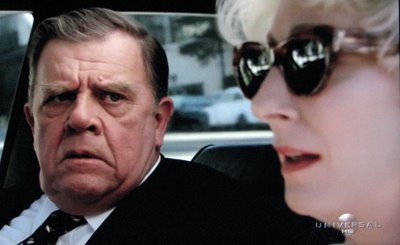
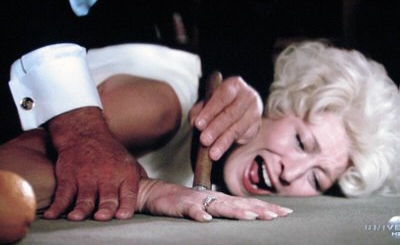
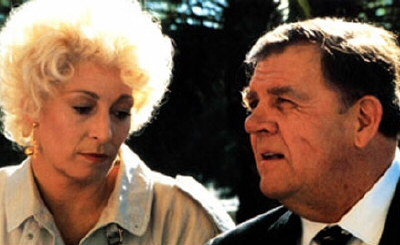
My favorite Hingle role and probably his most famous next to Gordon is bookie Bobo Justus from 1990's sublime Jim Thompson adaptation The Grifters. In a film overpopulated with outstanding character actors - Henry Jones, Stephen Tobolowsky, Gailard Sartain, Xander Berkeley, Frances Bay and the great J.T. Walsh - Hingle makes his role the meatiest, despite appearing in only two consecutive scenes. Possibly the most disarmingly sociopathic character in the history of cinema, Bobo is protective father figure to Anjelica Huston's Lilly Dillon as well as her incessant tormentor. "Do you want to stick to that story, or do you want to keep your teeth?" is a typical response to her attempts to pull one over on him, and the typically cool Lilly shatters like an abused little girl at his menacing glare. It's terrifying to see Hingle transition from doting softie to hard-edged gangster: needless to say a bag of oranges would never look the same to me after seeing the film's famous intimidation scene. Hingle once claimed Walter Huston as an inspiration, and this is such a Walter Huston take on the part (and not just because the one being tortured is Huston's granddaughter.) The paternal and the diabolical are blended together in a complicated and beguiling way that makes him doting and lovable when he's not burning cigars on helpless peoples flesh. His rotund physique goes from huggable to powerful and dangerous at the drop of a hat. He's like a bear in a nice suit prowling for food.
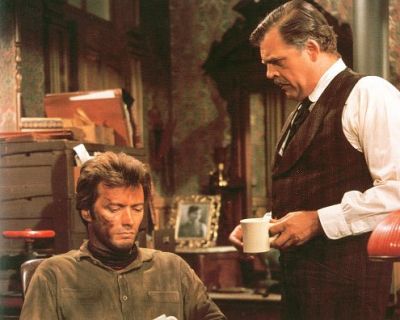
Sudden Impact was the third film he'd done with Eastwood after Hang 'Em High and The Gauntlet. Like Gauntlet, Sudden Impact was directed by its star. Sandra Locke's vengeful vigilante has led Harry to lawman Hingle's beach community, where it's made immediately apparent that he's not welcome. Hingle gives Chief Jannings the same immovable obstinance as Bobo Justus, except this time it's a shell that has slowly hardened around him over the years as the protective father in him has given way to casual corruption. In a memorable scene, Harry has gone into Janning's empty office and taken note of a particular (it turns out, incriminating) photo on the wall. Later when Jannings calls him into the office,Harry sees that the photo has vanished. He looks at the elusive lawman, and Eastwood and Hingle share an intense poker-game stare: screen acting just doesn't get any better than that.
So for this appreciation I watched some of Hingles movies that I've never seen before. The film I really wanted to find and watch was a 1970 adaptation of Charles Portis' excellent debut novel Norwood, in which Hingle plays shady businessman Grady Fring, but I wasn't able to track down a copy***. And the 1985 remake of Sam Peckinpah's Noon Wine, starring Fred Ward and Stellan Skarsgard (and... Jon Cryer) proved as difficult to find as the original. So I had to settle for what was available, but I wasn't disappointed.
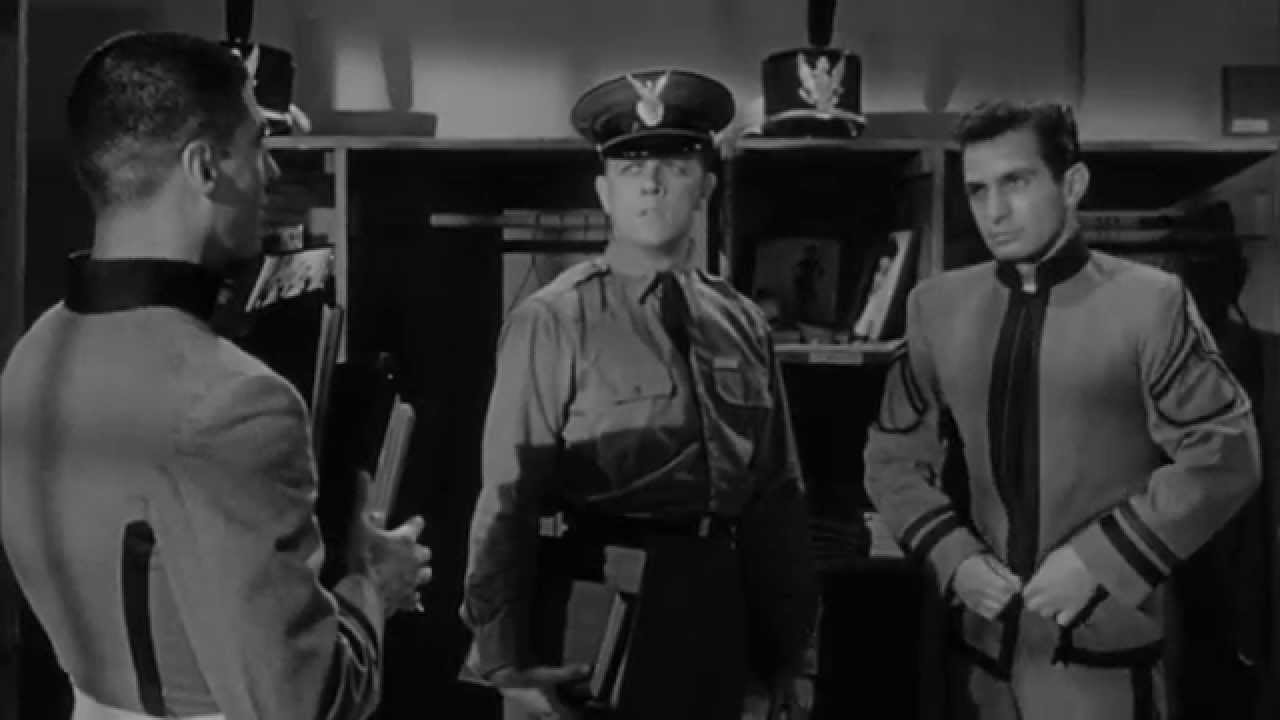
THE STRANGE ONE
jack garfein, 1957.
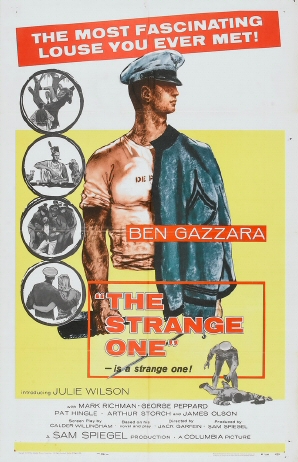 The Strange One is a strange title. It doesn't really capture the feel of the film it sounds more like a B-movie than the sort of high-minded theatrical adaptation the movie's trying to be. It's not even like Melville's Les enfants terribles, which was called The Strange Ones in its first American release: that title reflected other characters' perceptions of the children in the movie. Here, Ben Gazzara plays Jocko DeParis, a self-described Machiavellian schemer who abuseshis position as a senior cadet at a Citadel-esque Southern military school, torturing underclassmen (psychologically and through standard hazing) and setting up his enemies. His framing of another cadet that results in the young man's expulsion and the rising guilt of those under his thumb serves as the main story but it's never revealed why he'd be considered a "strange one." He's a bully whose charming manipulations either bring fellow students under his spell orintimidate them into submission;eventually the less-gullible cadets turn against him and bring about his downfall, but despite what all this says about Jocko nobody seems to consider him strange. So the title's a little weird
The Strange One is a strange title. It doesn't really capture the feel of the film it sounds more like a B-movie than the sort of high-minded theatrical adaptation the movie's trying to be. It's not even like Melville's Les enfants terribles, which was called The Strange Ones in its first American release: that title reflected other characters' perceptions of the children in the movie. Here, Ben Gazzara plays Jocko DeParis, a self-described Machiavellian schemer who abuseshis position as a senior cadet at a Citadel-esque Southern military school, torturing underclassmen (psychologically and through standard hazing) and setting up his enemies. His framing of another cadet that results in the young man's expulsion and the rising guilt of those under his thumb serves as the main story but it's never revealed why he'd be considered a "strange one." He's a bully whose charming manipulations either bring fellow students under his spell orintimidate them into submission;eventually the less-gullible cadets turn against him and bring about his downfall, but despite what all this says about Jocko nobody seems to consider him strange. So the title's a little weird
The film reminded me of Roger Corman's Sorority Girl from the same year, which I'd just watched recently for a Susan Cabot tribute. Sure enoughit turns out Calder Willingham's novel and play End as a Man served as a source for both films. Willingham**** also wrote the screenplay for Strange One; not surprisingly Corman*** ** not only neglected to credit the original source in his version (which he relocated to a sorority and cleansed of all homosexual subtext), he alsogot rid ofthe original title: The Bad One. Hm... that title would work well for either movie.
Director Jack Garfein seems like an interesting guy: an Auschwitz survivor, he refused to cut thefinal scene when the studio objected to having black actors appear in the film. He only made one other movie, 1961's Something Wild, about a rape victim held captive by a man who saved her from suicide (sort of an earlier version of Black Snake Moan possibly?) Risque material for the period I wonder why he stopped making movies (he may have gone on to focus on theater.) The Strange One is as well-directed as this kind of stagey, melodramatic, late 50's hot topic movie could possibly be; I'm actually surprised that it wasn't made by Elia Kazan. It's beautifully shot by Burnett Guffey, responsible for lighting such outstanding genre films as Jacques Tourneur's Nightfall andDon Siegel's Private Hell 36 (he also won Oscars for From Here to Eternity and Bonnie and Clyde, and shot two of the Nicolas Ray films recently reviewed by Christopher Funderburg as part of our Second Chances project.)
Speaking of Kazan, this film was Hingle's first credited role after appearing in a small bit as the bartender who hassles Brando about his old fighting style in the director's On the Waterfront - Hingle'd have a bigger part as Ace Stamper in his Splendor in the Grass. In The Strange One he's got a handful of key scenes as Harold Koble, Jocko's roommate and snickering toadie. If the title actually is a reference to one character's perception, it could be argued that Harold is the one who starts to see Jocko in a less enthusiastic light. At the beginning of the movie he's having as much fun as his buddy tormenting two freshmen in their room, ordering them to point their chests "to the at-mos-fear!" in a playful Southern draw that works perfectly with the actor's naturally languorous voice. After the framing of the cadet Harold begins to realize that his roommate's motivations go beyond the adolescent display of power and innocent harrassment, and his testimony leads to DeParis being forced out of town by his fellow cadets. Hingles pained expression as Gazzara is led to his fate (he can't help but feel guilty one way or the other!) is as seering as his farewell to the doomed sadist: "Jocko, I still think you got quite a sense of humor but you're about the lowest darn creature I ever seen in my life," a damning line of dialog similar to Barboura Morris' dismissal of Susan Cabot as "something the sea cast out" in Sorority Girl.
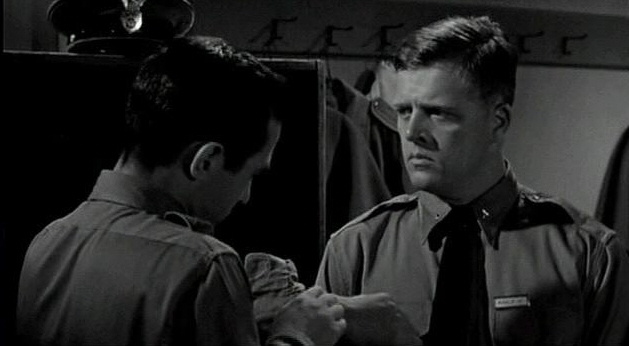
Unfortunately, Hingle's very good yet brief performance is nearly drowned out by two excruciatingly embarrassing acting jobs from his fellow cast members. Arthur Storch (who with buzz cut and thick glasses looks more like an Arthur Storch than anyone I've ever seen) plays the put-upon freshman targeted by DeParis because of his moral mulishness and social retardation.Apparently, the only word Storch cares about in that characterization is "retarded" based on his flagrantly over-the-top behavior. You really want to see this guy get the code red treatment: his physical flamboyance and overemphasizing of lines in an awkward intonation suggests Jerry Lewis with dentures too big for his mouth.Storch makes Larry "Danny in Invasion of the Body Snatchers" Gates' scene as a stuttering drunk officer seem absolutely nuanced.He went on to play the psychiatrist in The Exorcist but nothing else noteworthy on the big screen, thankfully.
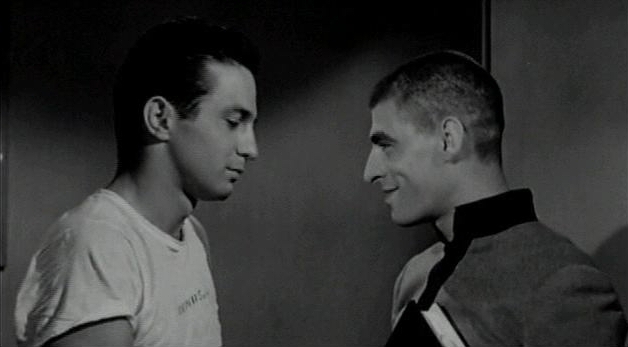
The second awful performance is from Paul E Richards, who ina ridiculous subplot plays an off-putting DeParis groupie and all-around oddball (the "strange one" of the title?) His adoration comes pouring out in a not-very-subtle sequence where he threatens to expose Gazzara (who plays the scene in a tight tanktop while fiddling with his "sword") if he doesn't indulge his obsession. Richards plays the scene - and I'm not exaggerating - exactly like a wily Tennessee Williams heroine, complete with Southern lisp and delicate swish of the hips. All he's missing is a decorative hand fan to cool the vapors as he pontificates towards Mr. DeParis, if you please. This is Richards' only credited film role, and it's not hard to see why. The scene was originally removed from the film due to its homosexual subtext (I say "subtext" but it's honestly as subtle as getting a dick slapped in your face on the subway), or maybe because it was just so
plainly awful. There's progress, and then there's depicting a gay character as a lithe, ultra-creepy blackmailer with ogling molester eyes. Even if his character is meant to symbolize Gazzara's self-hatred for his own latent sexuality it's a ridiculous scene and an awful performance, especially beside the skilled acting of Gazzara and Hingle*** ***.
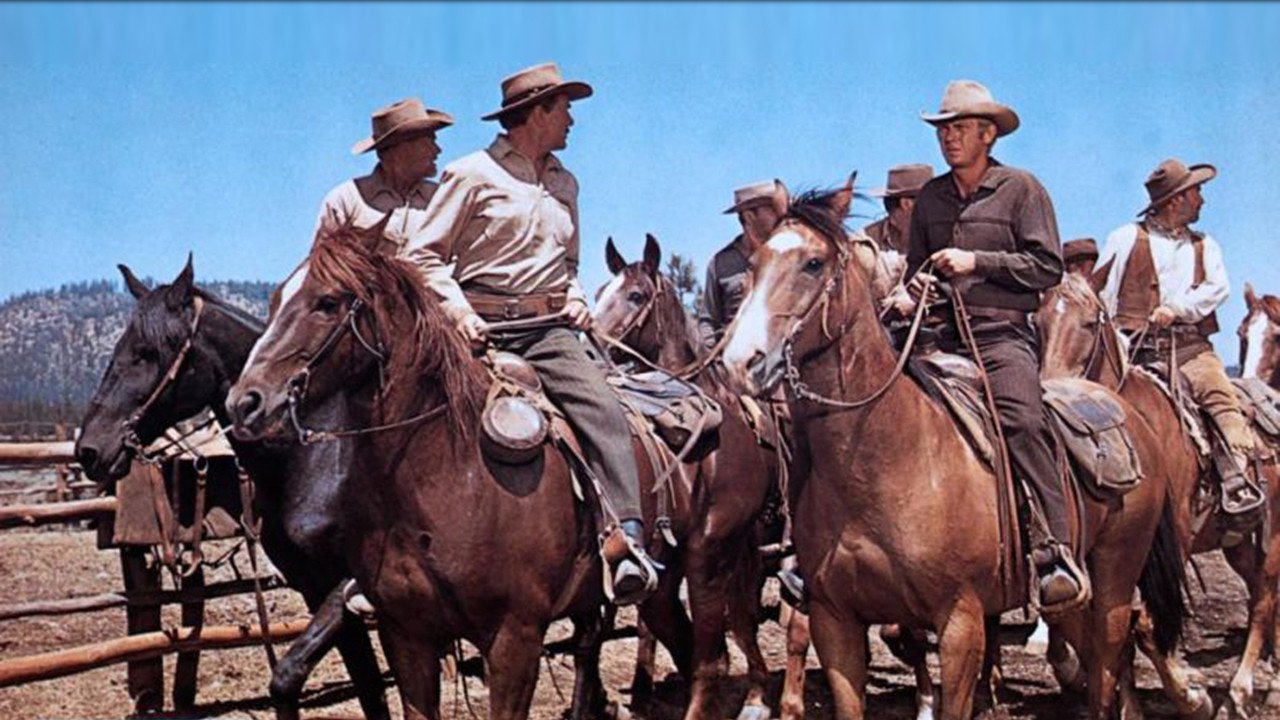
NEVADA SMiTH
henry hathaway, 1966.
All the great character actors punched in at clocks on the sets of Hollywood westerns (and western TV shows) and Hingle was no exception. Two years before siding up to Clint in Hang Em High, he turned up in this flawed but interesting revenge yarn. Despite looking about as Native American as Suzanne Pleshette, Steve McQueen plays a half-Indian white man named Max Sand who seeks vengeance after his farmer parents are set upon by a trio of vicious character actors in Henry Hathaway's prequel to The Carpetbaggers (which was filmed two years earlierby Edward Dmytryk.)
In another Calder Willingham-related coincidence, this film has a lot in common with Marlon Brando's One-Eyed Jacks co-written by Willingham including the usually sweet-natured Karl Malden playing the target of the hero's retribution. Although he and his two buddies (Martin Landau and Arthur Kennedy) are first seen beating an unarmed man andraping his wife, when he shows up later in the movie he plays the villain as a hilarious existential wreck. He knows McQueen is after him, knows what he looks like from wanted posters, yet when Max Sand makes the ballsy play of joining the gang under the pseudonym "Nevada Smith" - he drives himself crazy trying to prove that this guy is actually Sand. In the funniest instance he's giving his gang the lowdown on an ambush they're about to commit when he just suddenly shouts "Max Sand!" at them. McQueen doesn't react, and the outlaws look at him like he's lost his mind.
"He doesn't kill people he executes them! Yeah, he executes 'em!"
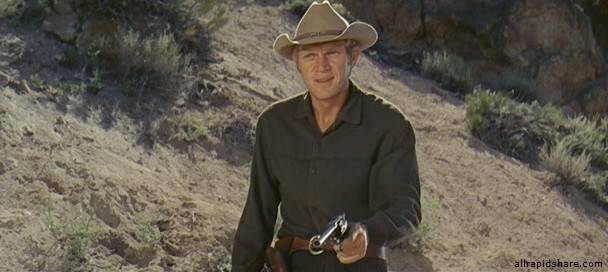
Hathaway, veteran of numerous western and war films, is a superb action director, hence True Grit's most memorable scene where John Wayne's Rooster Cogburn rides into the fray blasting away with a rifle in each hand, or the iconic moment of Widmark pushing the wheelchair-bound Mildred Dunnock down the stairs from Kiss of Death. As such, the action scenes in Nevada Smith are abrupt and intense, from a knife fight with Landau between rampaging cattle to a shootout in the bayou with Arthur Kennedy where McQueen emerges from the swamp with gun in hand, a vengeful wraith rising from the murky depths. In that respect, the movie lives up to Michael Herr's description of it in Dispatches: "McQueen working through a hard-revenge scenario, riding away at the end burned clearn but somehow empty and old too, like he'd lost his margin for regeneration through violence." Not so much Hathaway's love scenes, which are as artificial as the most dated of Hollywood melodramas.
In the middle of the movie, McQueen learns that one of his targets (Kennedy) is incarcerated in a Southern prison on the Louisiana bayou so he robs a bank and gets himself captured on purpose to infiltrate the chain gang. Hingle comes into the movie as Big Foot, a trusteein charge of giving orientation to new prisoners and, I guess,disciplining inmates in need of a good whuppin'. Although the warden appears sadistic in welcoming McQueen and theres a good amount of punishment handed out to disobedient inmates, it's actually not too bad: not only is Hingle an easy-going foreman, the prisoners get lots of outside air, theres plenty of work for everybody and even a program that allows women to come to the prison barracks after hours as an unbelievably awesome fringe benefit. McQueen plots with one of these women, Suzanne Pleshette, to escape with Kennedy so that he can a) kill him and b) you know, escape.
I've got to call Sand/Smith out on something: his vengeance is not only self-serving, it's also unnecessarily selfish. In flushing Landau out behind a herd of cattle, he lets the cows out and they scatter that's going to be a full day of gathering cows for whoever owns them. Then by using Pleshette to help him escape the prison, he's basically making sure the remaining prisoners never get conjugal visits ever again. Thanks a lot McQueen, you asshole! Life is going to suck even more for them now. Suzanne Pleshette's dead in the swamp of a snake bite, she's just more collateral damage to him. And poor Big Foot... not only does the warden threaten to make him serve out the rest of Sand's sentence if he doesn't bring him back (can he do that?), Hingle is just going to be a broken man after this. In his last scene he makes a Javert-style vow to bring McQueen to justice, but that's the last we see of him (a shame his character was interesting enough that a final scene
between the two of them would have been exciting.)
On top of all thatMcQueen lets the outlaw gangbushwhack and slaughter a bunch of innocent trailblazers BEFORE going after Malden. There's no advantage for him to wait out the ambush, he just twiddles his thumbs until after it's all over. All this and then he lets Malden live. What a dick. I don't know about this "Nevada Smith" character. If that is his real name.
Hingle did his character actor's duty and appeared in a number of westerns, from episodes of Rawhide to Invitation to a Gunfighter, and as late as 1995 Sam Raimi's The Quick and the Dead. It's interesting to see him as an unkempt, kind of stupid prison foreman when hes usually the harsh head honcho of this kind of operation. It's too bad he and McQueen never came together for a Nevada Smith sequel called Big Foot's Revenge.
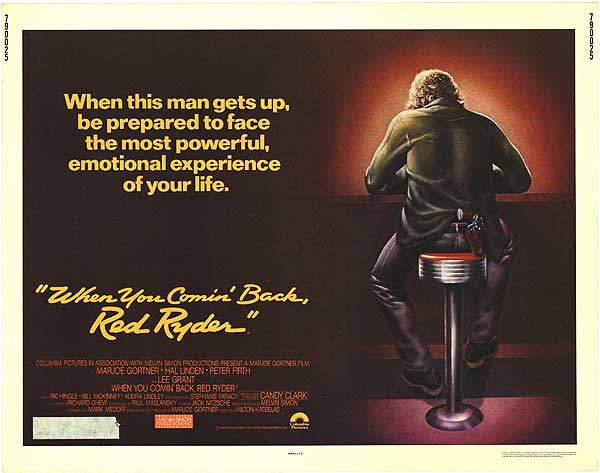
WHEN YOU COMIN' BACK, RED RYDER?
milton katselas, 1979.
I was interested in screening Tarantulas: The Deadly Cargo as the "late" Hingle title for this article, but ultimately decided on this interesting adaptation of Mark Medoff's play directed by Milton Katselas, most famous for being the key Scientology recruiter to the Hollywood acting community since 1965 (his thetans returned to Lord Xenu last year). Hingle's role in this one is exemplary of his late career appearances: he plays Lyle Striker, proprietor of a diner/gas station/motel called Benton's Cafe in a small New Mexican town circa 1968. The kind of friendly, over-eager small town serviceman who invites hotel guests to watch Mission: Impossible with him on TV, nametag proudly displayed under a dark blue bowtie, Lyle is the film's most tragic figure. Left leaning on a cane after a mild stroke (which happened one morning, "just after breakfast"), his easy-going and helpful demeanor puts him at the mercy of the other characters' mean-spirited cynicism. "Service is the name of the game," he offers repeatedly with a smile, a slogan that by the end of the movie turns out to symbolize a guile and intelligence beneath his inane exterior. He also listens to Andy Williams (bam, second encore!)
It's arguable that Angel, Benton's chubby waitress played with a complete lack of self-consciousness by Stephanie Faracy, is bit more pathetic than Lyle. She's the epitome of small town naivety and sweetness, chirping brightly at new customers and letting anything she can't engage on the simplest level soar clearly above her head. She's had a lifelong, unreciprocated crush on the title character, Stephen "Red" Ryder, a sulking dweeb who dresses and acts like a rebel without a cause to try and separate himself from what he sees as the banal, dead-end town. Her good-natured earnestness makes her the easiest victim for Teddy, a psychotic Vietnam vet who holds the patrons of Benton's Cafe hostage while taking each of them apart with relentless psychological warfare. Seeing her defenseless against his verbal attacks is deeply upsetting, especially since it brings her hopeless pining for Ryder out in the open.
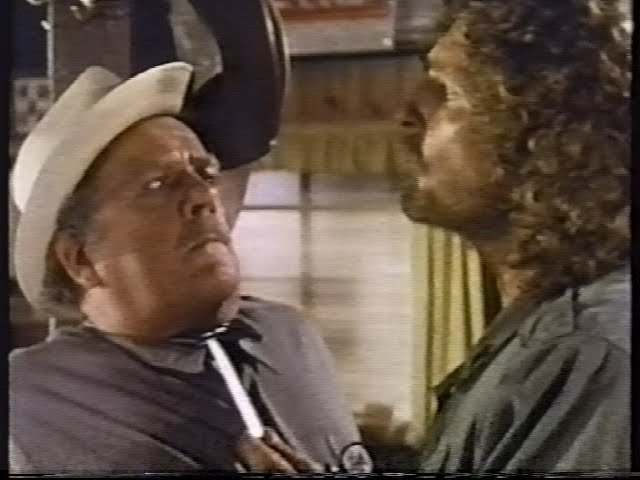
Personally, however, I think Lyle might be just a little sadder: for one thing, he's clearly in love with Angel! Maybe not in love, but as an old cripple with nothing else in his life she represents the possibility of affable companionship. Because he'd never actually dare make a move on her, Lyle comes off as somewhat lecherous but completely harmless. The saddest moment of the film is when he tells Angel she's got something in her eye and moves in close to her. He tries to make it a moment, but the second she reacts he backs off. "What was it?" she asks, and he smiles sadly. "...Alligator." Later the look on his face when forced at gunpoint to dance with her is heartbreaking.
Marjoe Gortner (former celebrity Pentacostal revivalist and the bad guy in American Ninja 3: Blood Hunt) plays Teddy like a gonzo game show host, forcing the ugly reality of each hostage from behind the curtain in a twisted pre-Haneke funny game. If Matthew McConaughey ever saw this movie he'd be horrified by his resemblance not only to Gortner and their similar accents but to how Gorner uses his laid-back good old boy persona to grate beneath the skin of his victims and draw out their base fears and personal demons. The second half of the film switches from Altman-esque multi-character subplots to the single location of the diner under Teddy's control, and it's a big credit to Gortner and the other actors that it never seems uncomfortably stagy. It's one of those rare one-shot performances that makes you wonder why the actor didn't go on to bigger things, but convinces you that it's probably better that he had this one character made all the more believable by Gortner's anonymity. [there's actually a really fascinating documentary about Gortner called Marjoe. I believe it even won the Academy Award for best doc (but don't let that kill your interest) - christopher]
Hingle handles moments between the action inside the diner where Lyle is gently trying to turn Teddy's hesitant yet armed accomplice Cheryl (Candy Clark) against him with carefully-drawn out suspense. Speaking to her kindly and not attempting to manhandle the gun away from her, he perfectly embodies both Lyle's paternal nature and inherent inaction to anything: the hostage situation, saving his friends, his entire life up to this point. I think in Red Ryder more than any of the other films, Hingle's presence offers a richness to what could have been a throwaway character to the benefit of the overall film. He also met his second wife, Julie Wright, while filming the movie. So that worked out pretty good for him.
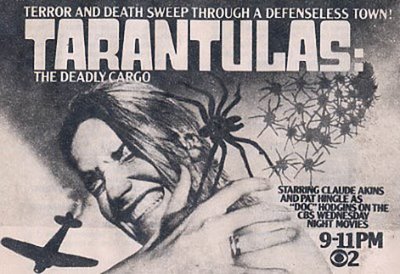
TARANTULAS: THE DEADLY CARGO
stuart hagman, 1977.
Well just by coincidence I happened to be browsing a used DVD shop recently and found a copy of this movie for a dollar. I never would have recognized the title if not for this article, so I thought what the hell, extra write-up. How many character actors can boast that they inspired someone to purchase a cheesy TV movie from the 70's about a town overrun by killer spiders? I'm guessing six, maybe seven tops.
In the first scene, Tom Atkins and Howard Hesseman are transporting 3,200 lbs. of Ecuadorian coffee beans into the States on a DC-3. Just before takeoff they're hassled by federales for tax on the coffee, but luckily there's no tarantula tax since seemingly hundreds of the creepy crawlies have stowed away on the plane. After a convoluted series of events (the plane hits a storm and crashes and townspeople come together to try and save the passengers but the plane explodes - why couldn't the plane just land so the spiders could sneak off? Why the big production?) the unfortunate community where the cargo came down finds itself beset by the tiny fanged beasties.
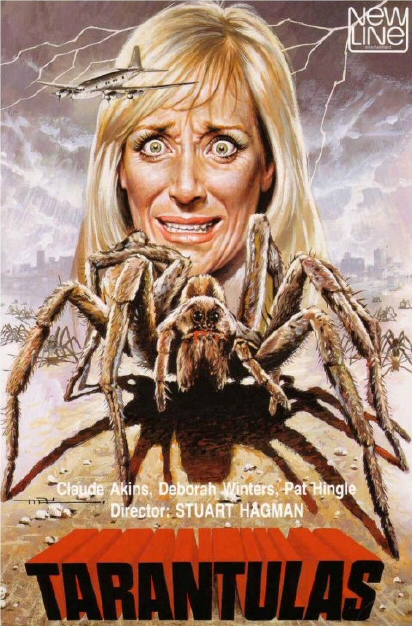 Although the plot is identical to Arachnopohobia, it's clearly modeled after Jaws. Instead of keeping the beaches open for business, the greedy town fat cat is concerned about the spiders holding up the orange production. There's a child casualty, in this case the dumbest kid in movie history (he's been informed that the spiders are deadly yet attempts to pick one up with his hand for no apparent reason.) And the hero shoves an air tank into the mama tarantula's mouth, quips "Smile you son of a bitch!" and shoots the tank, causing it to explode.
Although the plot is identical to Arachnopohobia, it's clearly modeled after Jaws. Instead of keeping the beaches open for business, the greedy town fat cat is concerned about the spiders holding up the orange production. There's a child casualty, in this case the dumbest kid in movie history (he's been informed that the spiders are deadly yet attempts to pick one up with his hand for no apparent reason.) And the hero shoves an air tank into the mama tarantula's mouth, quips "Smile you son of a bitch!" and shoots the tank, causing it to explode.
Well, the last part doesn't actually happen. In fact, the main characters come up with a seemingly intelligent if excruciatingly boring-to-watch climatic solution to stereo the buzzing of predatory wasps into the orange factory, thus causing the poisonous arachnids to freeze up. They then go about eliminating the eight-legged fiends one at a time by dropping them into vats of alcohol. While that's technically more satisfying than the Snakes on a Plane solution of "let's just go where there are no snakes," it's not exactly a rousing finale.
Hingle plays the most ethical character, the town doctor who strives to save the victims (it's a one-bite one-kill scenario) and becomes the first person to put two and two together and expose the spider threat. He starts out with an "I'm not even supposed to be here today!" attitude - he's covering for the regular physician but quickly steps up to the plate and warns people of the real threat. Shockingly, it's not his most demanding role but he approaches it with the same level of professionalism as any of his meatier movie parts, even though his character disappears by the end of the movies second act. A graceless exit...how appropriate for a character actor!
I'm not sure if appearing in this did anything for his career, but some of the spiders probably went on to crawl on Alfred Molina's back in Raiders of the Lost Ark.
~ 2009 ~
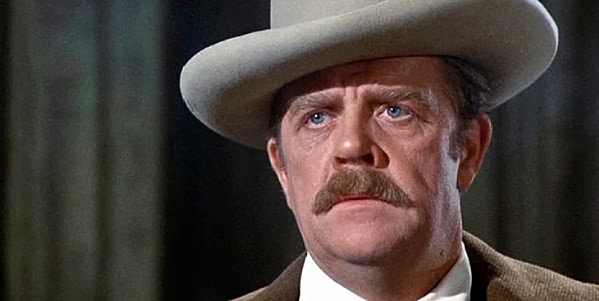
* * As per usual I'll leave summaries of the actor's backgrounds their childhood etc to Wikipedia. However, one thing I feel needs to be mentioned is that Hingle, as a young man, oncefell down a 54 foot elevator shaft and almost died. He lost his left little finger in the fall.
** Should they call the next movie The Caped Crusader? Cuz I always thought that nickname was pretty awesome. But no... that title sounds too fun for a modern Batman movie.
*** You know which of Hingle's films IS available on dvd? The Rape of Richard Beck, aka Violated, a TV movie in which Richard Crenna is critical of rape victims until he too is raped. Yikes.
**** Can you imagine writing the same story as a novel, play AND movie? I would think he'd be pretty sick of the story after all that work.
*** ** Hingle did a Corman movie: 1970's Bloody Mama, with Shelley Winters as Ma Barker.
*** *** The Strange One was Gazzara's first film role as well as Hingle's. Both had starred in the original,Elia Kazan-directed Broadway run of Cat on a Hot Tin Roof - they were all three replaced in the 1958 film by Paul Newman, Jack Carson and Richard Brooks,respectively. (It used to be Newman who was replaced in film versions of plays he had headlined. Remember the miscasting
of Bogart in The Desperate Hours?)








 The Strange One is a strange title. It doesn't really capture the feel of the film it sounds more like a B-movie than the sort of high-minded theatrical adaptation the movie's trying to be. It's not even like Melville's Les enfants terribles, which was called The Strange Ones in its first American release: that title reflected other characters' perceptions of the children in the movie. Here, Ben Gazzara plays Jocko DeParis, a self-described Machiavellian schemer who abuseshis position as a senior cadet at a Citadel-esque Southern military school, torturing underclassmen (psychologically and through standard hazing) and setting up his enemies. His framing of another cadet that results in the young man's expulsion and the rising guilt of those under his thumb serves as the main story but it's never revealed why he'd be considered a "strange one." He's a bully whose charming manipulations either bring fellow students under his spell orintimidate them into submission;eventually the less-gullible cadets turn against him and bring about his downfall, but despite what all this says about Jocko nobody seems to consider him strange. So the title's a little weird
The Strange One is a strange title. It doesn't really capture the feel of the film it sounds more like a B-movie than the sort of high-minded theatrical adaptation the movie's trying to be. It's not even like Melville's Les enfants terribles, which was called The Strange Ones in its first American release: that title reflected other characters' perceptions of the children in the movie. Here, Ben Gazzara plays Jocko DeParis, a self-described Machiavellian schemer who abuseshis position as a senior cadet at a Citadel-esque Southern military school, torturing underclassmen (psychologically and through standard hazing) and setting up his enemies. His framing of another cadet that results in the young man's expulsion and the rising guilt of those under his thumb serves as the main story but it's never revealed why he'd be considered a "strange one." He's a bully whose charming manipulations either bring fellow students under his spell orintimidate them into submission;eventually the less-gullible cadets turn against him and bring about his downfall, but despite what all this says about Jocko nobody seems to consider him strange. So the title's a little weird






 Although the plot is identical to Arachnopohobia, it's clearly modeled after Jaws. Instead of keeping the beaches open for business, the greedy town fat cat is concerned about the spiders holding up the orange production. There's a child casualty, in this case the dumbest kid in movie history (he's been informed that the spiders are deadly yet attempts to pick one up with his hand for no apparent reason.) And the hero shoves an air tank into the mama tarantula's mouth, quips "Smile you son of a bitch!" and shoots the tank, causing it to explode.
Although the plot is identical to Arachnopohobia, it's clearly modeled after Jaws. Instead of keeping the beaches open for business, the greedy town fat cat is concerned about the spiders holding up the orange production. There's a child casualty, in this case the dumbest kid in movie history (he's been informed that the spiders are deadly yet attempts to pick one up with his hand for no apparent reason.) And the hero shoves an air tank into the mama tarantula's mouth, quips "Smile you son of a bitch!" and shoots the tank, causing it to explode. 